Fairy Fencer F: Refrain Chord, a new RPG from Idea Factory, is the sequel to Fairy Fencer F: Advent Dark Force — an expanded remaster of the original Fairy Fencer F. Fairy Fencer F was a mediocre RPG with great music but Advent Dark Force was a tenfold improvement and the definitive version of Fairy Fencer F. I enjoyed Advent Dark Force a lot, so I decided to review Refrain Chord.
While prior Fairy Fencer F games were traditional turn-based RPGs, Fairy Fencer F: Refrain Chord is a strategy/tactical RPG like Disgaea. This change raised the hackles of Fairy Fencer F fans that prefer traditional RPGs to strategy/tactical RPGs and remember past Idea Factory SRPGs, like Agarest: Generations of War, being subpar. Rest assured, thanks to developer Sting‘s involvement (they’re the brains behind games like Yggdra Union), Fairy Fencer F: Refrain Chord is enjoyable for existing series fans. It’s not deep enough to please hardcore tactics fans, but this is Fairy Fencer F and not Fire Emblem.
Note that I said Refrain Chord is enjoyable for existing series fans. Experience with prior Fairy Fencer F games is required to glean the most out of Refrain Chord‘s direct connections. It’s not entirely clear at what point after, during, or even parallel to Advent Dark Force that Refrain Chord takes place, but Refrain Chord assumes complete familiarity with Advent Dark Force‘s characters, setting, and plot. If you haven’t already adventured with slacker protagonist Fang, his consternated companion Eryn, and their other wacky friends, then Refrain Chord will be completely lost on you. Not only do our heroes begin the game as an entourage of established friends, but their individual personalities may put off players unfamiliar with their quirks.
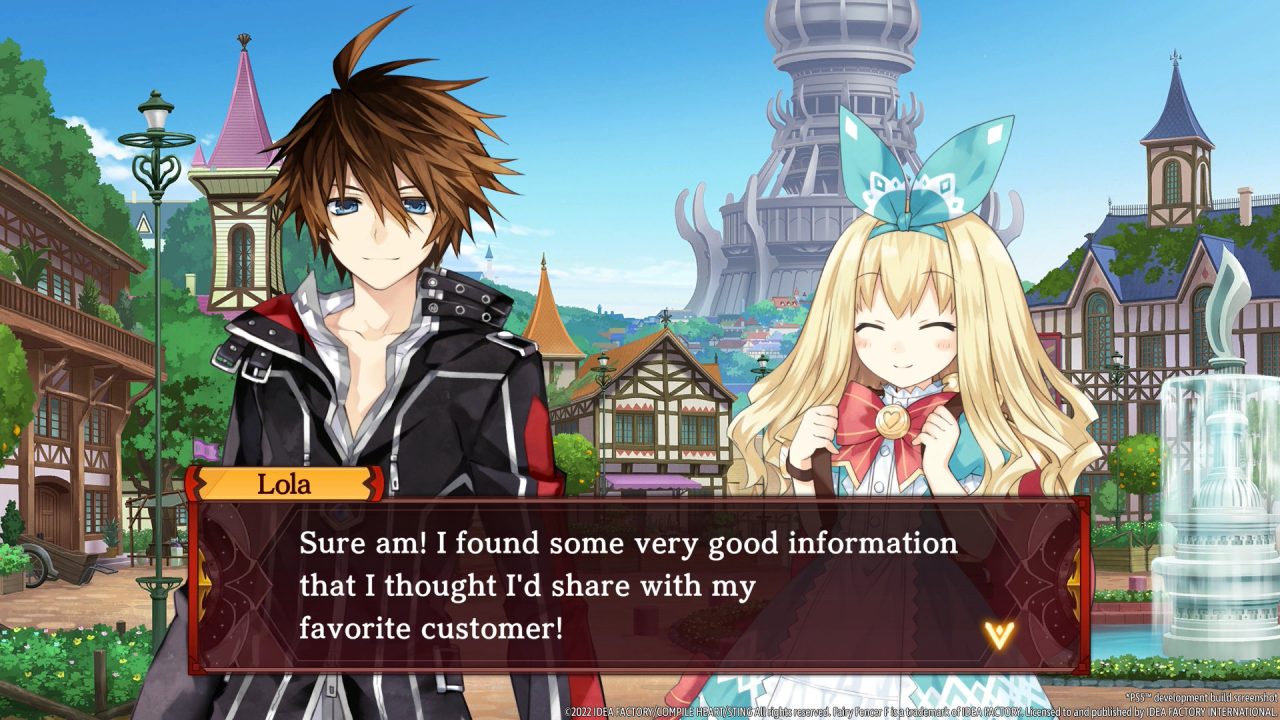
Colorful new characters debut in Refrain Chord, and they all seamlessly mesh with the core ensemble cast. The most prominent new characters are Fleur and Glace — two Muses who sing powerful songs that buff or debuff combatants within their spheres of influence. Fleur aids and encourages our heroes, whereas Glace lends her manipulation and brainwashing skills to the insidious Dorfa corporation.
History often repeats itself within the Fairy Fencer F mythos and Refrain Chord starts in a similar manner to Advent Dark Force. Fang is under arrest again for dining and dashing, leaving Eryn to bust him out of jail. Once reunited with his friends, we learn that Fang and company are still (or perhaps once more) after a bunch of MacGuffins called Furies (weapons imbued with beings called Fairies) so they can resurrect The Goddess and get a wish granted. This is no easy task, because Dorfa is also after Furies to resurrect the Vile God and conquer the world with his destructive power. The plot is enjoyable, if sometimes disjointed, and plays with the concept of alternate timelines established in Advent Dark Force. Like Advent Dark Force, Refrain Chord is a slow burn requiring patience and commitment before it gets interesting.
This is an Idea Factory game, so “fanservicey anime cringe” comic relief scenes exist, but they’re “tell” rather than “show.” For example, in one optional scene, I read hijinks-filled dialogue about Eryn looking for her missing undies, but didn’t see any cutscene still pictures of her (or her undies) in compromising positions. Whether you’re relieved or upset that Idea Factory didn’t take the fanservice that far is up to you.
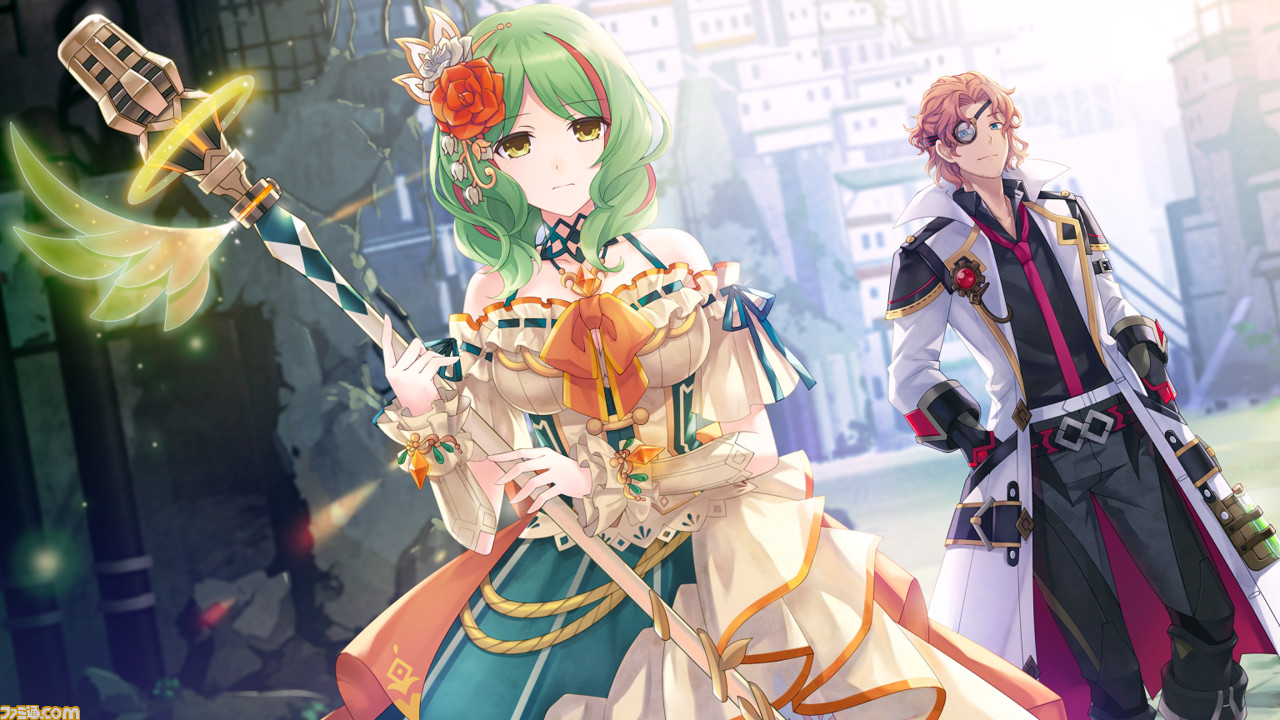
Players can select from three difficulty levels (easy, normal, or hard) that can be switched whenever the main menus are accessible. Menus contain a lot of information and complex character-management options (befitting a strategy RPG). The button commands and navigation take some getting used to, but it’s smooth sailing once you do. Past Idea Factory games were notorious for messy and convoluted menus, so Refrain Chord‘s attractive and usable interface is a breath of fresh air.
Refrain Chord plays like a proverbial strategy RPG, meaning it’s like chess with additional bells and whistles. Battles are generally small party skirmishes (only a few members can battle at a time) in large battlefields where player and enemy units take turns moving a select number of square spaces and executing actions. Terrain height and type play a role in tactics. For example, attacks executed from higher ground do more damage, and units in tall grasses have limited accuracy. Positioning is also important, since attacking from the side or behind does additional damage.
Signature Fairy Fencer F mechanics, like Fairize, return in Refrain Chord. Successfully hitting enemies builds up the Fairize gauge that, when filled, allows a character and their fairy-infused weapon to combine into a superpowered form for a limited number of turns. Refrain Chord also features a modified version of Advent Dark Force‘s Avalanche mechanic. Once the Avalanche gauge is filled up (also via successful hits), party members within a certain radius simultaneously attack enemies within that radius, like Persona 3‘s All-Out attacks.
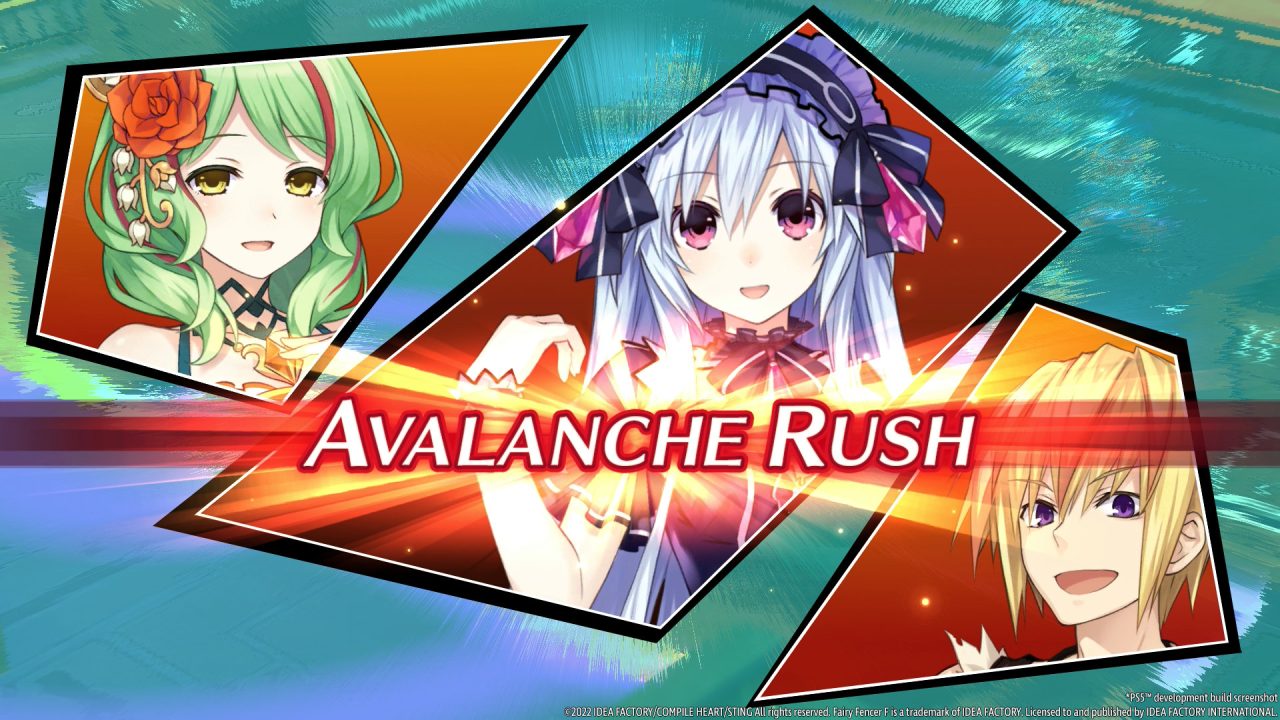
Fleur and Glace, while weak physically, have the power to influence large portions of battlefields through their Fairy Aria skills. When a Fairy Aria is performed, a portion of the battlefield lights up and anyone within it is subjected to the buffs and debuffs that it confers. When Fleur and Glace’s Arias overlap, they create a Dramatic Resonance where multiple effects are in place. Avalanche attacks within Dramatic Resonance areas are superpowered and have the added bonus of inflicting debilitating statuses on enemies.
Battles sometimes run long because many enemies possess exceptionally high HP or defense. Having all my party members present on the field rather than just a few of them would have reduced the tedium of lengthier battles. At least non-participating characters earn partial EXP, so nobody’s levels fall too far behind. It’s important to keep everyone adequately leveled, because you never know who will be required to participate in some battles.
Besides the main story battles, Refrain Chord features plenty of optional battles to obtain goodies, explore side stories, and build levels. The main quest includes sudden difficulty spikes that are usually resolved with a little grinding, making side battles unavoidable. Depending on the chosen difficulty level and how much side content you pursue, Refrain Chord‘s 25-chapter play time easily exceeds 30 hours. Given the lengthy battles, repetitive cutscene-town-battle progression, and difficulty spikes, Refrain Chord sometimes drags. This game is best in small doses rather than marathon sessions.
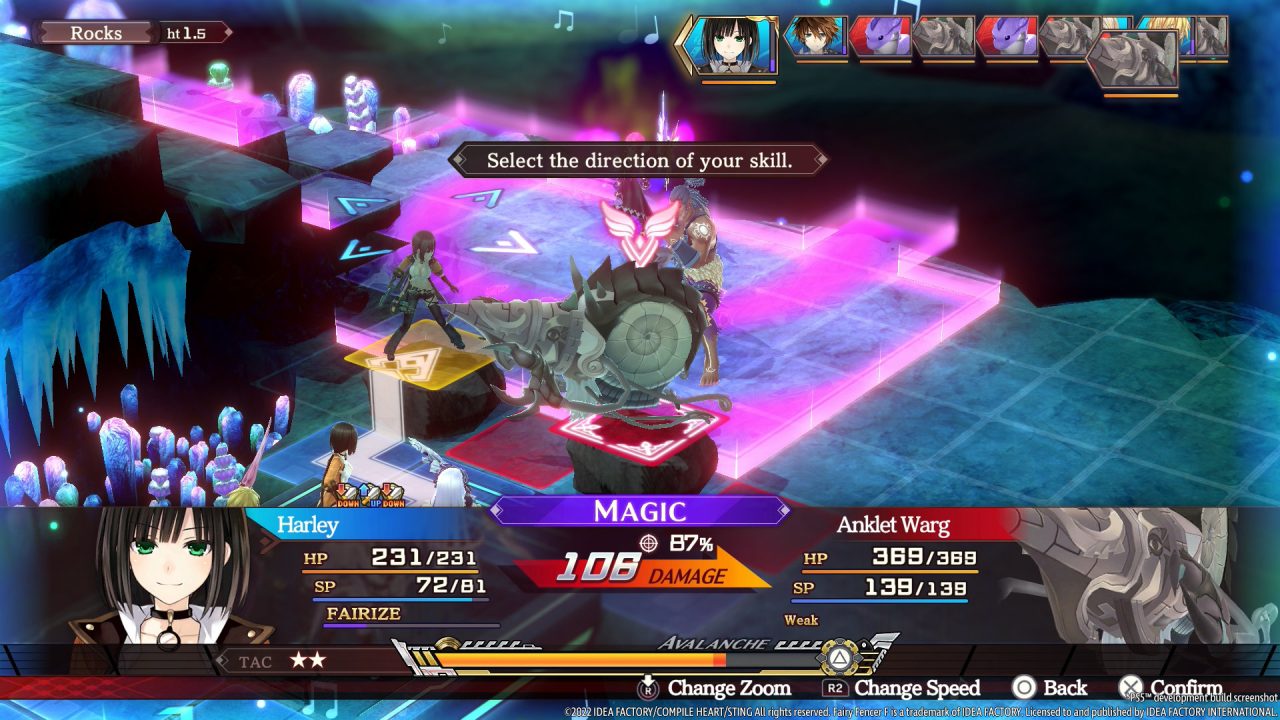
Outside of battles, the main side activities are viewing optional visual-novel-style character dialogue events at the inn and participating in Location Shaping. I thoroughly enjoyed the character development in these dialogue events. Everyone in Fang’s unlikely entourage has charming push-pull interactions with each other that play off of their strongly differing personalities. Some events are goofy, others are sensitive, and all are worth watching. Besides being fun, the events you elect to watch and the order in which you view them influence the ending. As with Advent Dark Force, the endings of Refrain Chord leave open the possibility for future installments. Location Shaping is a hot-and-cold-style mini-game where you stab a Fury into a portion of the overworld to obtain treasure. This welcome distraction became more engaging as I spent time with it.
Music plays a key role in Refrain Chord. When Fleur or Glace initiates one of their Fairy Arias, the battle theme music changes depending on the selected Aria. When both Fleur and Glace are active, their respective theme songs harmonize together in interesting push-pull ways. The new opening, title, and battle themes are solid as well. Unfortunately, the town, overworld, cutscene, location, and several other themes are taken verbatim from Advent Dark Force‘s soundtrack. While Advent Dark Force had a fine soundtrack, I’ve heard its music already and wanted something fresh in Refrain Chord, like remixed versions of the carryover themes.
I was also disappointed that Refrain Chord only has Japanese voices. The Japanese voice acting is good, but I rather liked Advent Dark Force‘s English voice cast and wanted to hear them again. Without the English voices, my old friends felt like strangers, especially my favorite character Galdo. I was so used to his exaggerated Minnesota-esque accent in Advent Dark Force that its absence in both voice and text-based dialogue made me exclaim, “Who are you, and what have you done with Galdo?”
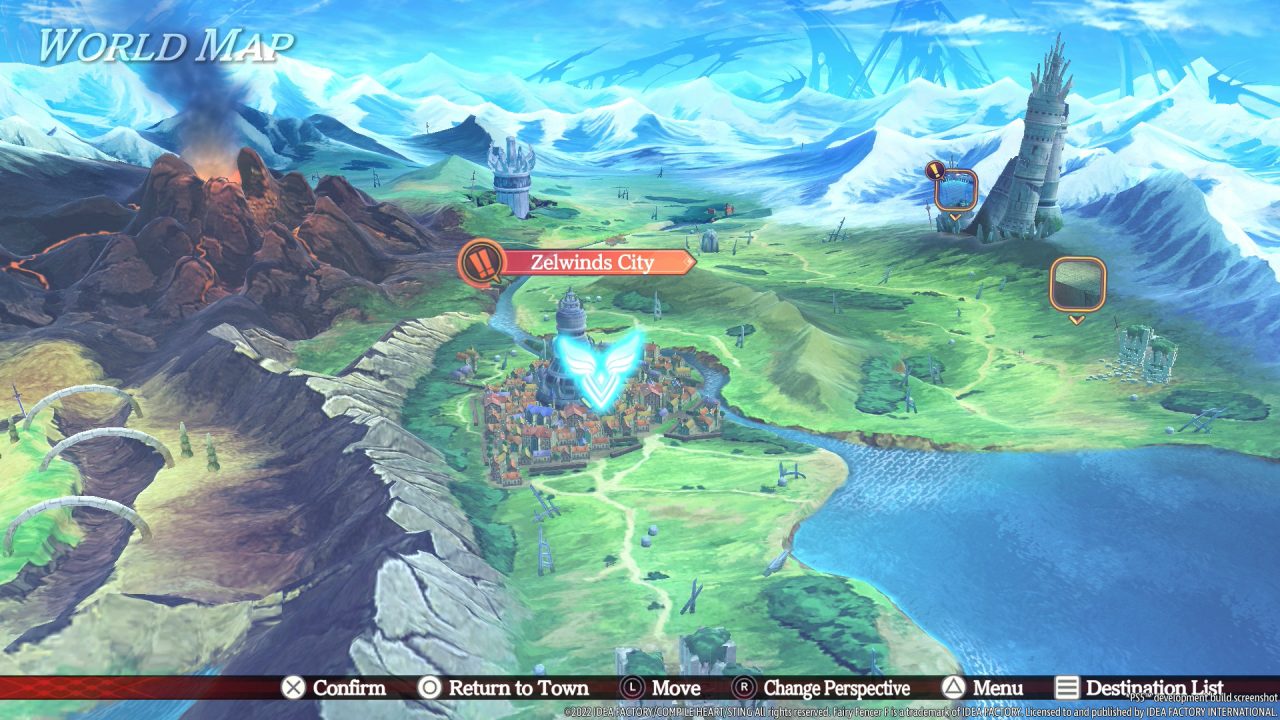
The graphics recycle a lot of assets from Advent Dark Force as well. The character portraits and backgrounds for the visual-novel-style cutscenes are copy-pasted from Advent Dark Force without any additional animations, details, or polish to make them feel more current-gen. At least the town and overworld maps got a fresh look. The battle graphics get the job done and look fine, if also last-gen. Because the battle graphics are 3D polygonal, I could pan the camera in all directions to get dynamic views of the battlefield and see around obstacles. This is very important, because while the glowing green and purple Arias and Resonances look flashy, they often obscure the more subdued colored squares that indicate the range of a character’s movement or skill. Panning the camera overhead allowed me to see those obscured squares better.
Fairy Fencer F: Refrain Chord, despite being a different animal than Fairy Fencer F: Advent Dark Force, is not the standalone game it wants to be. Refrain Chord is for existing Fairy Fencer F fans only, because it does nothing to ease newcomers into the Fairy Fencer F universe. My overall feelings about Refrain Chord echo my thoughts about Advent Dark Force. The visual-novel-style cutscenes were great, but the game’s progression often dragged. Fairy Fencer F: Refrain Chord is worth a look, but only if you’re patient and already invested in the Fairy Fencer F mythos.


